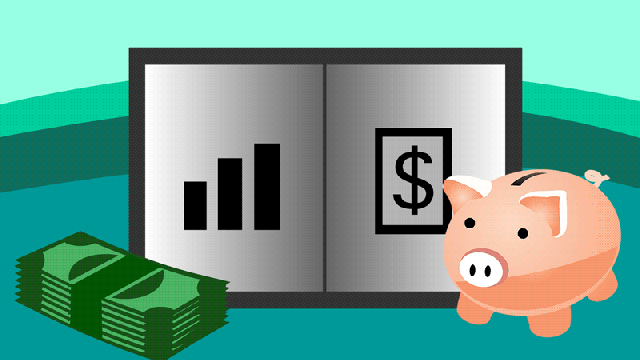Anyone who’s improved their money skills will tell you: It’s not about the rules. OK, the rules are important, but they’re not nearly as important as your habits and behaviour. After navigating my own relationship with money and writing about it for five years, I’ve learned that it comes down to four basic factors: Control, mindful decisions, balance and resourcefulness.
Illustration by nick criscuolo.
A Sense of Control Helps You Feel Powerful

When I was broke and paying off my debt, I got a weird high from seeing my balance drop, and that high made me want to keep going. The same thing happened when I set up a direct savings deposit into my retirement fund and watched the balance rise. After a while, I would check it and think, “Oh snap! I did that?” I felt a rush, and that rush made me want to save even more.
A high, a rush, whatever you want to call it, it was really just a sense of control that made me want to keep going and, eventually, gain power over my money.
In fact, the entire point of personal finance is learning to control money. And that’s hard, because most of us feel the exact opposite: We feel like money controls us. It keeps us from taking that awesome trip on our bucket list. It keeps us from leaving a job we hate.
When you read those crazy profiles on someone who paid off $100,000 of debt in a few years, they didn’t accomplish it by just being frugal or making more money. Don’t get me wrong, those are necessary. However, when you get down to the meat of the story, it’s about control. They learned to take control of their situation and do what they could, when they could.
Money is boring and overwhelming, and no one wants to give it much thought. That’s part of the problem. We want to know how to fix our finances, but we’re too scared to really dig into them. Here are a few things that worked to help me get my finances under control:
- Remove the money taboo. A lot of popular personal finance blogs got started because their owners wanted a platform to hold themselves accountable and openly talk about money. You don’t have to start a blog, but you can talk to your family and friends about your money goals. You can immerse yourself in your own finances and track every penny. Regularly reading personal finance sites and blogs every day is a good way to get used to thinking about and discussing money openly.
- Set some meaningful goals. Don’t just create a budget because you should have one. Ask yourself why you want to stick to that budget. Is it to support your family? Get out of debt and travel? Whatever it is, when you have a meaningful goal to work toward, money management isn’t some boring thing you’re supposed to do because it’s responsible. It’s about accomplishing the stuff that matters to you. In this way, you flip the script — you make money work for you rather than the other way around.
- Come up with a plan. Draft a plan that’s unique to your spending, income and goals. The 50-30-20 budget is great, but don’t just follow someone else’s formula to get your finances on track. Make sure it’s a formula that fits your needs. That might mean tweaking the rules to do what works for you. Overall, you want to see your actions make a difference because that makes you feel powerful and in control.
Control doesn’t come easy when you feel like the deck is stacked against you. It’s pretty hard to feel in control when you have a massive loan crushing you and you can’t find a job, but the fact remains: A sense of control is still a necessary part of the solution. Ultimately, all of the other factors go back to cultivating a sense of control.
Decisions Make You Feel in Control

Overall, the way to cultivate a sense of control is through making purposeful, conscious decisions.
Taking action, even if it’s a small action, can be powerful. For example, let’s say you decide to put $10 more a month toward your debt. It’s a small action, yeah, but small stuff adds up. More importantly, though, when you make a decision to take action, you exert power and control, and that’s priceless in the long run.
In his new book, Smarter Faster Better, author Charles Duhigg talks about this concept in detail. He discusses the importance of an “internal locus of control”, which is basically what we talked about in the previous section — you feel like your actions affect your destiny. And Duhigg confirms that one way to motivate yourself is to make decisions. He writes:
Motivation is triggered by making choices that demonstrate to ourselves that we are in control. The specific choice we make matters less than the assertion of control. It’s this feeling of self-determination that gets us going.
In other words, by focusing on a decision, you feel in control, and that motivates you.
Taking action is one thing, but there’s a difference between blindly following the rules and deciding to take action. For example, you set up a budget because that’s what you’re supposed to do, but then you never check in on it and adjust it, making it meaningless. The rules are important, but sometimes we use them to delegate the really important work. Deciding to take action is a little different. You’re not just doing what you’re supposed to do, you’re doing what’s right for you. It’s a small but important distinction and here’s how it might translate to some personal finance basics.
- Instead of drafting a budget to get out of debt, decide which debt payoff method works best for your situation.
- Instead of saying you’ll ask for a raise, decide how you’re going to bring it up to your boss and decide how much more you’re going to ask for.
- Instead of just cutting back on spending, decide what expenses you really need to cut back on to make a difference. Decide how much you need to cut back and focus on spending with a purpose.
We’ve told you before that, ironically, being awesome at money sometimes means bucking the basic rules of Money 101. And that’s where mindful decisions come in: You’re not just following some blanket rules. You tweak the advice to accommodate your unique financial situation. Being mindful and aware of your money habits goes a long way toward establishing your control.
Balance Holds It All Together

Of course, sometimes you’ll make the wrong decisions. Maybe the debt payoff method you picked isn’t working. Maybe you overestimated your willpower. Maybe your raise didn’t work out.
Control is important, but control alone isn’t going to solve every problem. You have to learn to recalibrate, and that usually means finding some kind of balance or compromise.
For example, when I wanted to supercharge my debt payoff, I completely overestimated my willpower. I threw every cent toward my debt and had nothing left over. Naturally, when I spent money on even the tiniest expense, it totally threw everything off, I incurred a bunch of overdraft fees and, worst of all, I felt like a failure, which did nothing for that sense of control.
Despite making a decision and trying to exert control, my actions backfired and I wrecked my finances. So I had to rebalance it all. I had to learn to build a better budget, work with my habits and tweak my plan. Control and mindfulness are part of the process, but it also takes a fair amount of adjusting and compromise to get your money in order.
So much of personal finance works out this way. You have to find the balance between spending today or saving for tomorrow. You have to find the balance between being frugal and wasting your time. Extremes rarely work well. It usually comes down to finding a happy medium that’s right for you, then working toward your money goals at a steady, reasonable rate.
Resourcefulness Helps You Defy the Status Quo

Balance is important, and there’s another useful quality that can help you reach your goals: Resourcefulness. Being resourceful might mean you:
- Find a side gig or take advantage of overtime
- Learn to meal plan so that you can reduce your grocery budget
- Optimise your home for energy savings to cut your electric bill
The list is endless, and not every tip will apply to you. If you’re resourceful, though, you focus on the tips that do apply, and put them to work. Every person’s situation is different and while there’s some blanket personal finance advice that applies to everyone, managing your money ultimately comes down to what works for you. We’ve told you what it takes to be a little more resourceful, and it basically boils down to:
- Forget the word “should”: We use the status quo for a frame of reference, but that can get in the way of a better option. Should you have a car payment because everyone else does, or should you just save up, buy a decent used car in cash and save money on interest payments?
- Focus on what you can do, not what you can’t: Again, when you’re resourceful you don’t get hung up on what doesn’t work. It helps to know your obstacles, but rather than get hung up on them, you look for solutions.
- Learn to seize opportunities: Resourceful people look for opportunity in everything they encounter. They look at things from a perspective of how it could affect their bottom line.
It does take effort to tailor advice to your own situation, give up what you “should” have to benefit your overall financial health and look for opportunities in unlikely places. If you can learn to optimise every avenue to support your financial goal, though, that will really go a long way in establishing control. And again, control is pretty much everything.
Photos: Julie F, Blondinrikard Fröberg, Ajay Goel, klndonnelly

Comments